
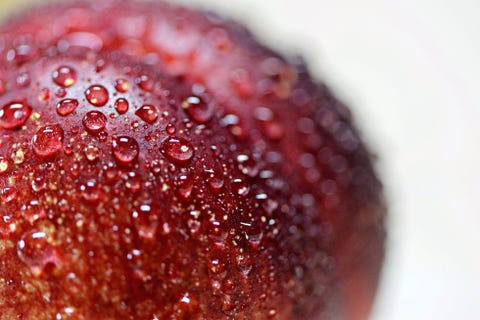
Rashes are kind of the worst, no matter where they are on your body. But getting one on your butt? That’s a whole ‘nother level of misery. (Have you ever discreetly scratched a butt itch in public? No, because you can’t.)
Inconvenience aside, they’re also a little concerning. Sure, that little bump on your butt could just be a pimple, but what if it’s a little more serious—say, a little bigger and redder and actually kind of painful? Can you treat it with an over-the-counter cream, or do you need to make an appointment with your doc? Check out these signs of the most common rear-end rashes—along with their treatments—to help you decide.
If the rash is: a cluster of painful or burning red bumps and blisters
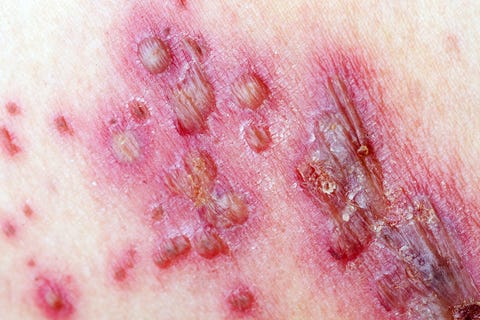
Getty Images
It’s probably: a herpes outbreak
Herpes is typically thought of as something that can only affect your mouth and genitals, but it can crop up on your butt, too, says Joshua Zeichner, M.D., director of cosmetic and clinical research in dermatology at Mount Sinai Hospital.
When the virus flares up—due to stress or illnesses that weaken your immune system—it can come to the surface of the skin, causing a rash, explains Zeichner. The rash will probably go away on its own in about a week, but it’s contagious through direct contact, so it’s best to avoid getting too intimate. You can also try an OTC cold-sore medication or see your dermatologist for a prescription antiviral to clear up the outbreak faster, says Zeichner.
If the rash is: a red circle with a white scaly ring around it
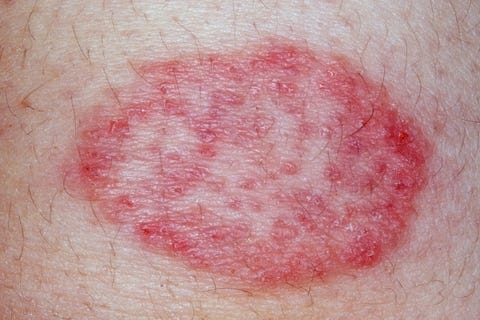
Getty Images
It’s probably: a fungal infection
If you’ve ever picked up athlete’s foot (a.k.a. ringworm or tinea corporis) from your gym’s locker room, you’ve seen this fungus before—and, yeah, it can show up on your butt, too.
It thrives in hot, humid environments, so working out in the summer time (or sitting around in sweaty workout clothes or steam rooms) increases your risk, says Zeichner. He recommends treating the rash ASAP with an athlete’s foot cream so it doesn’t spread; apply it twice a day for one to two weeks, and see your doctor if it doesn’t go away.
If the rash is: red with tender, pimple-like bumps
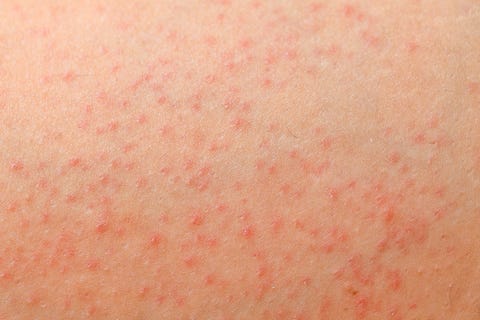
Getty Images
It’s probably: folliculitis
Most people call this “butt acne,” but that’s not entirely accurate, says Zeichner. Those pimple-like bumps are actually superficial infections of the hair follicles—otherwise known as folliculitis.
Mild cases may be helped by washing with antibacterial soap. For recurring cases, Zeichner recommends washing with a surgical-grade cleanser like Hibiclens or an acne-treatment wash with benzoyl peroxide. To prevent future outbreaks, keep the skin clean and dry (especially after workouts), and wear breathable fabrics.
If the rash is: red plaques covered in white scales and located inside your butt crack

Getty Images
It’s probably: psoriasis
In this chronic (and often genetic) condition, your body’s immune system “gets angry and attacks the skin,” says Zeichner. Psoriasis usually shows up on elbows and knees, but in between the butt cheeks is a common spot, too.
You can treat it with a 1% hydrocortisone cream, but prolonged use can damage your skin. If it’s not going away, check in with your doctor for a prescription-strength anti-inflammatory cream.
If the rash is: patchy and itchy, sometimes with tiny red bumps
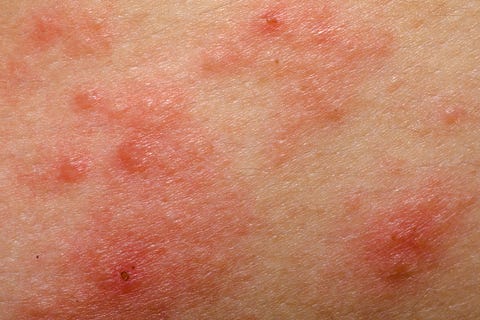
Getty Images
It’s probably: eczema
Eczema is an inflammatory skin condition that causes skin to dry out and crack—often caused by genetics, irritants, or allergies. These microscopic cracks develop in the outer layer of skin, so the key to treatment is hydrating and repairing the skin barrier with moisturizers and anti-inflammatory creams, according to Zeichner.
Eczema on your butt may be caused by irritating fabrics, detergents, toilet paper, or cleansing wipes, so be mindful of what’s coming into contact with your skin back there.
If the rash is: super itchy and on your anus
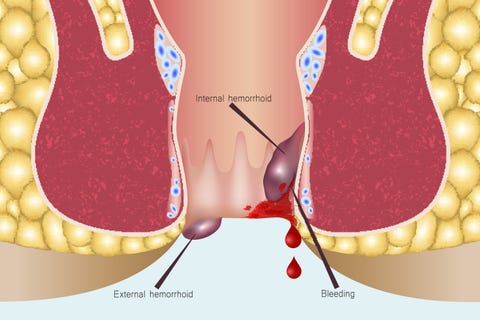
Getty Images
It’s probably: hemorrhoids
Straining during bowel movements (thanks, chronic constipation or pregnancy) causes hemorrhoids, i.e., swollen and dilated blood vessels around your anus. These protrusions are itchy, painful, and hard to ignore.
They’re pretty common and can be treated with OTC witch hazel pads or hemorrhoid ointments, but Zeichner recommends getting medical attention (or a G.I. evaluation) if they’re causing you to bleed during bowel movements—that’s something you never want to ignore.
Source: Read Full Article